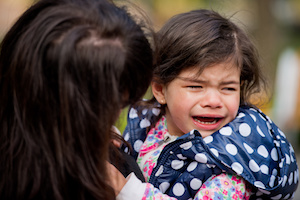
Your toddler is no longer an easily distracted baby. Right on schedule, she's growing up. It's exactly what she's supposed to be doing -- but it means challenges for you!
- Toddlers are beginning to experiment with their sense of themselves as powerful people in the world, so they can also be defiant.
- Toddlers are determined, so they can also be obstinate.
- Toddlers are exuberant, so they can also be impulsive about doing dangerous things.
- Toddlers are excited about exploring, so they can also get into lots of trouble faster than you can answer the doorbell.
- Toddlers don't have an off switch. When they get tired, they get more and more wound up, until they crash.
Here's how to manage your little maelstrom, so you can enjoy the terrific twos!
Positive Discipline with Young Toddlers
Your child is no longer a baby, but a toddler. That means he will advocate fiercely for his needs. He can't express himself well yet so he gets frustrated easily, but he actually comprehends a great deal. His biggest problem is that he can't tell you many things that you need to know!
Managing Your Toddler: TANTRUMS!
Tantrums are nature's way of letting toddlers discharge their fears frustrations when life is just too much, so instead of feeling like a bad parent, or thinking you have a bad kid, welcome tantrums as a chance for your child to vent all those yucky feelings. And since tantrums are a sign your child is overwhelmed, remember that prevention always works better than cure.
Managing Your Toddler: Giving Choices
Your toddler needs some control over his world. He doesn't necessarily understand your agenda -- why should he? He wants what he wants. But that doesn't mean you have to give up what you need. Don't give in. Give Choices!
Managing Your Toddler: Timeouts?
Timeouts are great to give yourself a little space so you can calm down. But using them on your kid? They don't work with most kids, and they don't work with any kid for long -- at least not without damaging your relationship.
Why Every Home Needs a Calm-Down Corner
Every time you soothe your child and help him feel safe and understood, you're helping him build a brain and nervous system that will allow him to calm himself in the face of upset and adversity -- for the rest of his life.
Should You Spank Your Toddler?
Should you spank your toddler? Not if you want a cooperative, responsible, considerate child who grows up with self-discipline.
Setting Limits
Setting limits is one of the most important skills of parenting. If we do it right, our kids will internalize the ability to set limits for themselves, which is otherwise known as self-discipline.
Positive Discipline
Discipline that works. Your kids will be so well-behaved and cooperative that gentle guidance will suffice. And you don't even have to be the bad guy!
Handling Your Own Anger
"This is the best webpage I’ve found so far on what to do when you, the parent, are angry. Most say something like, 'Deal positively with your anger!' which makes me say, “Like HOW?” This page makes it pretty clear how."
-Milkbreath & Me
Two year olds like to throw things. They throw when they're happy and they throw when they're upset. They also hit their parents and their siblings. Our job? To help them get through this normal developmental phase by teaching them the difference between what they may and may not do - over and over again - until they learn what they need to learn. How? By accepting their feelings even as we stop and redirect their unacceptable behavior. For example:
"Hold it! Blocks are not for throwing - even when you're angry. Here, you can throw the pillow or the balloon."
"Ouch, that hurt! I can't let you hit me. But you can tell me what you feel. You can say, 'I don't want you to be with the baby now. I want you to be with me!' "
"No shoving! Tell your sister what you want with words, not shoves. Tell her, 'My doll. I'm not ready to share.' "
"The carpet is not for cutting. Let's see, what can you cut? How about this paper? Or this cardboard? Which one? You decide."
-- Elaine Mazlish & Adele Faber





